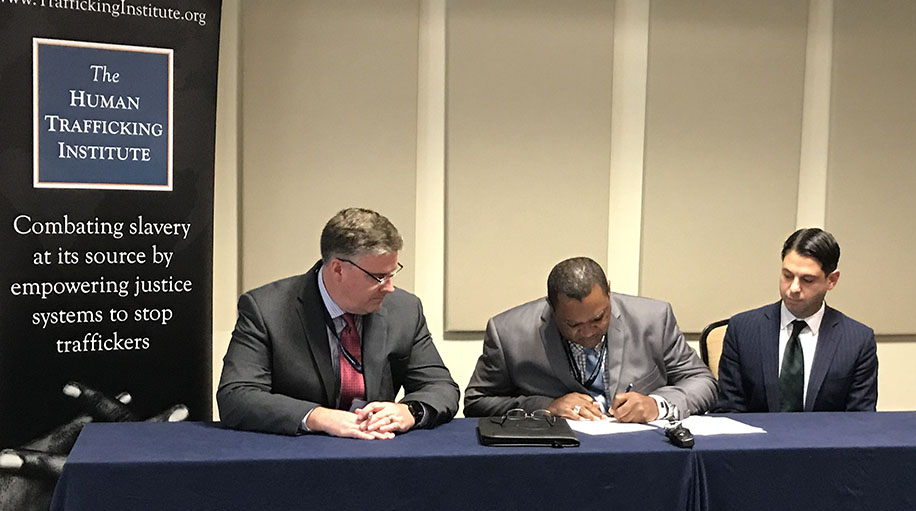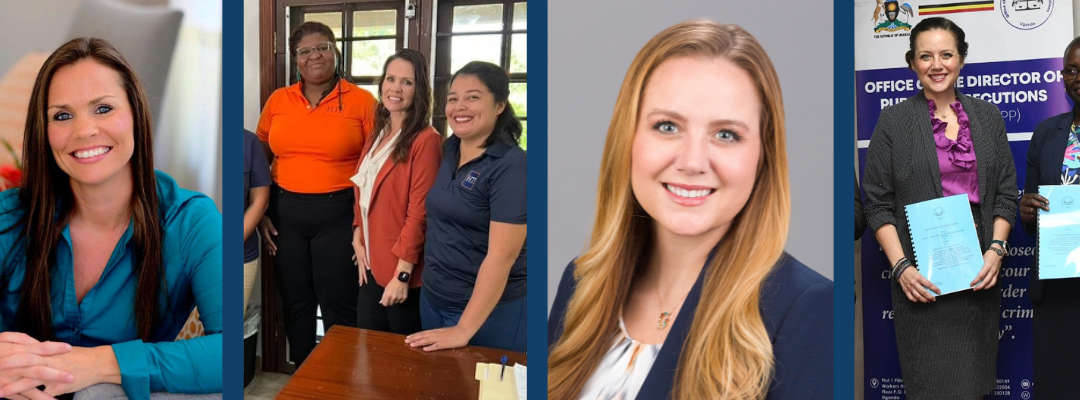The Belize Police Department and the Human Trafficking Institute entered into an agreement to partner in building the capacity of Belize’s Specialized Human Trafficking Unit, formed earlier this year. Commissioner of Police Allen Whylie, who leads the Belizean national police department, signed the agreement in Washington, D.C., on Thursday, October 25.
The agreement provides for office space for members of the specialized unit, as well as staff of the Institute, who will provide ongoing technical investigative assistance in trafficking in persons (TIP) cases. The space will also serve as a secure and private location for interviewing TIP victims and witnesses, collecting evidence, and planning operations. In addition, the agreement helps ensure the specialized unit has the essential tools and resources it needs to carry out proactive human trafficking investigations, including a designated vehicle to aid the specialized unit in its care for TIP victims and investigation and prosecution of TIP cases. Previously, officers working on time-sensitive TIP cases had to rely on borrowing other police vehicles that were not always available.
“It was in 2017 when I was first introduced to the Human Trafficking Institute,” Whylie said. “Since then, we have agreed on areas that the Institute and the Belize Police Department could cooperate and collaborate in terms of strengthening our efforts to rid Belize of the scourge of human trafficking and modern day slavery. I am very pleased to be here to sign this memorandum of understanding, which will see the resources and the assets of the Human Trafficking Institute and the Belize Police Department working together in terms of improving our efforts on the issue of slavery and human trafficking.”
This four-year agreement outlines a shared financing structure between the Belize Police Department and the Institute for the office space and designated vehicle. The Belize Police Department and the Institute will share the costs of the vehicle throughout the four years of the agreement, the Police will assume increasing responsibility for funding the costs of the office space.
“Once the Commissioner created a dedicated TIP unit and staffed it with multiple officers, it was clear the unit would also need their own space to handle cases and that space was not available at police headquarters,” said Dave Fillingame, Institute Special Counsel in Belize. “A separate and secure office space for operations and interviews is necessary for the unit to do its job, and the department’s commitment to co-financing the office shows its long-term commitment and dedication to fighting trafficking in the country.”
To ensure the specialized unit’s success, the new office space will be designed with consultation from criminal justice and after-care professionals as well as other experts in the human trafficking field.
“This is a remarkable opportunity to shape the space in which the specialized human trafficking unit in Belize will do its work, including its interviews of victims,” said Marie Martinez Israelite, who previously led the U.S. Department of Homeland Security’s Victim Assistance Program and now serves as the Institute’s Director of Victim Services. “It is significant to bring together victim advocates, criminal justice professionals, survivors, and other anti-trafficking experts to consult on the design of the setting so that it ultimately promotes both physical and psychological safety for victims.”
The agreement came at the conclusion of the Human Trafficking Institute’s Global Human Trafficking Academy in which specialized police, prosecutors, and victim specialists from Belize, South Africa, and Uganda engaged in two weeks of intensive, skills-based training and learned cutting-edge strategies for handling human trafficking cases. The Academy brought together a world-class faculty comprised of leading law enforcement, prosecution, and trauma experts to enhance the participating countries’ efforts to combat the crime of human trafficking. The Institute’s ongoing technical investigative assistance will build on the skills learned at the Academy.
“By partnering with members of the Belize Police Department to strengthen their skills and capacity through the training at this Academy, and then supporting them with the resources they need through this agreement, we believe the number of trafficking cases brought to the courts will increase, resulting in more traffickers being held accountable and fewer victims being exploited,” said Dave Rogers, Institute Director of Law Enforcement Operations.
The agreement also comes one year after the Institute hosted a delegation of Belizean Cabinet members and other senior officials in Washington, D.C., where they met with high-level U.S. counterparts on human trafficking at the Justice Department, FBI, State Department, and other government agencies. The delegation formed recommendations to improve Belize’s capacity to respond to TIP cases that were presented to and adopted by the Belizean Cabinet. The Institute then partnered with the U.S. Department of Homeland Security to train Belizean criminal justice practitioners on anti-trafficking interviewing techniques. At the request of the Chief Justice of Belize, the Institute also hosted a large training on trafficking in persons cases for Belize’s judiciary.
“We are honored to enter into this agreement with the Belizean government, and specifically the police department” said Victor Boutros, Institute Chief Executive Officer and Founding Director. “The creation of a human trafficking specialized unit comprised of dedicated police officers was an important step forward in the battle against human trafficking in Belize. Dedicated specialized units are one of the essential components to making serious progress in stopping human traffickers. We are pleased to support Belize’s efforts to measurably improve its trafficking enforcement, and through this agreement, provide ongoing assistance to this specialized unit and essential resources necessary for them to continue their work against human trafficking in Belize.”
Read more about the Institute’s partnership with Belize here.




